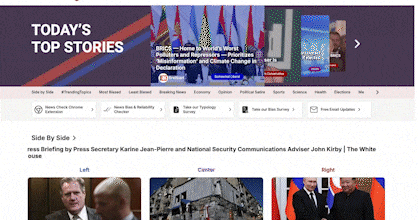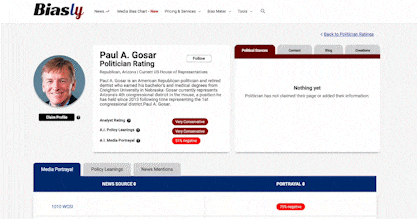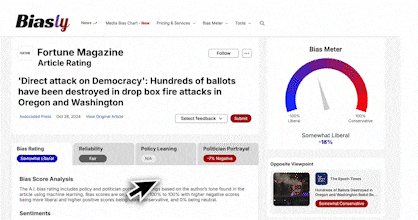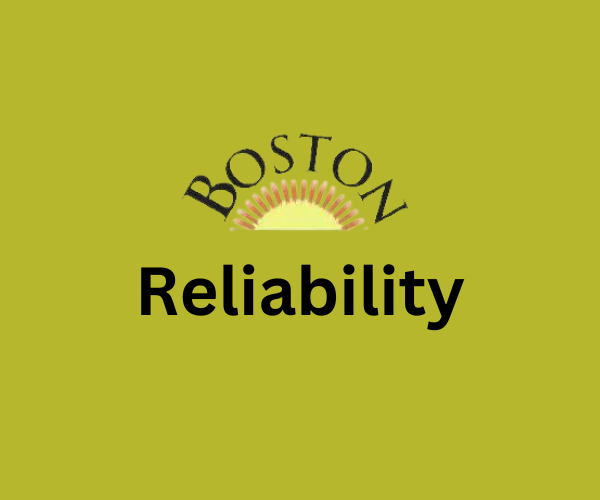
While there has been increasing attention toward national and large-scale newspapers in recent decades, The Boston Sun, a local paper serving the Boston neighborhoods of Back Bay, Fenway, Kenmore, and the South End, has survived these shifts. This may be because Americans continue to see value in local papers. According to Pew Research, most U.S. adults believe that local media perform well in terms of reporting.
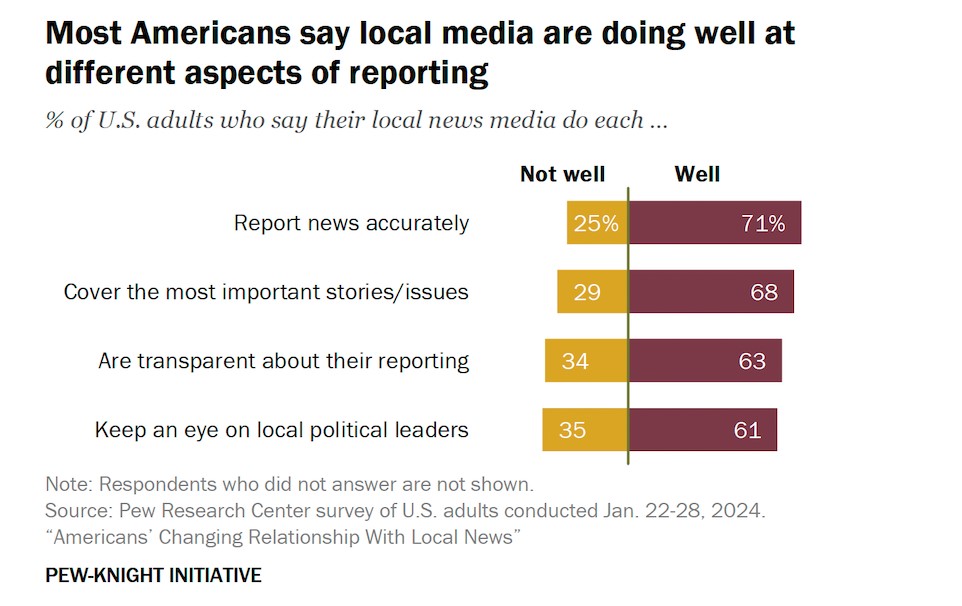
Source: Pew-Knight Initiative
Does Reliability Matter?
Reliability, in general, refers to how trustworthy or accurate information, or in this case, a news source is. If we consider this definition, it quickly becomes clear why reliability is important in media sources. If we can’t trust the things we read then there isn’t much of a point in continuing to consume content from that source, after all. So how exactly can we gauge the reliability of a news source anyways?
There are several potential measures of reliability to look out for when trying to determine whether a media source is reliable or not. Red flags for an unreliable article can include the presence of wild unsubstantiated claims, facts dependent on other unreliable sources, heavy use of opinionated language, and more. Some indicators of a reliable news source, on the other hand, include things like:
- Absence of subjective/opinionated language in articles
- Credible sources cited (e.g., neutral sources, .gov, .edu websites)
- Facts and statistics backed by multiple relevant outside sources
- Use of primary sources when possible (e.g., interviews, quotes)
- Information that remains consistent across news sources
So How Does The Boston Sun Fare in its Reliability?
The political reliability index developed by Biasly objectively assesses news organizations’ accuracy and trustworthiness. The Boston Sun’s overall Reliability Score has been rated as ‘Fair’ by Biasly. This rating is a weighted average of two distinct scores: the Fact Analysis Score and the Source Analysis Score, each evaluating separate components of The Boston Sun’s Reliability. When computing the Average Reliability of the article the Fact Analysis score is more heavily weighted. These ratings are as follows in the next two paragraphs:
The Boston Sun’s Fact Analysis Score is not currently provided. The Fact Analysis score focuses more on the accuracy of claims, facts, and sources presented in the article and any hints of selection and omission bias, which we will discuss further in the article.
The Boston Sun’s Source Analysis Score is ‘Fair,’ which suggests readers can trust some of the sources, links, and quotes provided by the news source. This score, which is based on A.I., focuses on assessing the quality of sources and quotes used including their number, lengths, uniqueness, and diversity.
These scores are based on percentages and averages meaning that articles in The Boston Sun could vary in their level of trustworthiness due to their author, context, or other factors. Since the overall Reliability Score is based only on the Source Analysis Score, it may not show the full picture. While the sources used by The Boston Sun can sometimes be trusted, it is unknown whether its articles are factual.
Let us analyze the supporting data for The Boston Sun’s rating and discuss what the Fact Analysis score may be. This will highlight what is important to look for in searching for trustworthy news sources.
The Boston Sun’s Accuracy and Reliability
Though many Americans believe local newspapers to be doing a good job in their reporting, it is important to take a closer look to determine whether this is true. Bias and political orientation play a large role in the credibility of a news organization. The Boston Sun has been determined to be a Center-Left paper, according to Biasly. This likely decreases the chances for selection and omission bias when looking at an article’s factuality. However, it is important to still look at The Boston Sun’s articles and evaluate their integrity. In doing so, we can see how well the publication supports assertions with evidence, and therefore, how good of a reporting job the local paper is doing.
Selection bias is when stories and facts are selected or deselected, often on ideological grounds, to create a narrative in support of the new sources’ ideology. Omission bias, on the other hand, is when different opinions and political views regarding a situation are left out so that the reader is only exposed to the ideological perspective supported by the author. It’s important to keep in mind these two types of biases when trying to assess an article’s level of accuracy.
To calculate the reliability ratings of articles, Biasly weighs assertions made with evidence and the number of reliable internal and external sources used. Then, Biasly gives a percentage score to accuracy, with one being the least accurate and 100 being the most. As stated previously, The Boston Sun has a Fair reliability score. However, this rating can vary between articles, and these variations are often caused by bias, notably omission, and selection bias.
For instance, the article entitled “Boston Places 14th on Annual Trust for Public Land ParkScore Index, Boosted by Strong Scores for Park Access Index” was given a score of ‘Fair’ for reliability by Biasly. It received a bias score of Moderately Liberal and a score of “Poor” for having opposite sources which impacted this overall rating.
However, an editorial called “Change in Marijuana Scheduling Was Long Overdue” received a rating of “Poor” from Biasly. This was largely due to its subcategorized ratings of “Poor” on opposite sources, quote length, multiple quotes, unique sources, and multiple sources. The article also leaned slightly conservative in policy, and had a slight positive portrayal of politicians.
Some articles in The Boston Sun also contain selection bias. A piece written by the Boston SUn’s staff titled “Wu Files FY25 Budget With Investments To Make Boston a Home for Everyone” is rated as Somewhat Conservative and given a score of Fair for its reliability. While the author does a good job at including quotes from both Mayor Wu and the city’s Chief Financial Officer, the article fails to include any quotes that are skeptical of the efficacy of Wu’s budget. There are also only two instances of quotes, which often makes the article more vulnerable to omissions of viewpoints and bias. The singular quote of the Chief Financial Officer reads:
“The budget we are presenting today is a responsible budget built on a strong and reliable financial foundation, bolstered by our triple-A bond rating,” said Chief Financial Officer Ashley Groffenberger. “As the City of Boston continues to experience stable revenue growth, the City is able to make critical investments that support our ability to deliver services to residents, businesses, and visitors.”
The overall tone of the article is positive towards the mayor’s budget, with little to no mentions of criticism towards it. Opinions are merely stated as facts, with the author writing statements such as:
“This proposed budget increases accessibility and improves City processes to continue providing exceptional constituent services across Boston’s neighborhoods.”
The article would be more reliable if the author had not written these types of sentences with subjective assertions. It could also be improved upon if the author included opposing perspectives in order to look at the Mayor’s budget more holistically. With this, the article would be more reliable.
Later, we will dive further into the reliability of The Boston Sun, taking a more in-depth look at similar examples. This will include its use of selection bias, omission bias, and the quality of its sources and facts used.
Analysis of Reliability in The Boston Sun’s Opinion Pieces
Opinion pieces serve as a way for journalists to express their views on topical issues which is typically avoided in news reporting. These articles can be good to read in order to increase one’s understanding of differing political perspectives. However, opinion articles are typically seen as less trustworthy due to their subjective writing.
The Boston Sun’s editorials are written by their staff and cover ongoing events and issues in Boston. Since it is a local paper, it serves as a good way for its readers to learn more about opinions on issues that are close to them as well as read local perspectives on national and global news. However, if the information in papers like The Boston Sun is not trustworthy or entirely factual, it may not be reliable for local readers.
While The Boston Sun is a Center-Left paper, its articles such as the previously mentioned one about Mayor Wu’s budget can be opinionated – though it is advertised as reporting. These types of articles can decrease the paper’s reliability and may be a part of the reason for The Boston Sun’s rating of Fair reliability. To examine this further, we should take a closer look at whether readers should be relying on The Boston Sun’s opinion articles for factual and trustworthy information
Quality of Sources and Facts Used
In the editorial, “State Budget Woes: Here We Go Again” by The Boston Sun’s staff, does not use any quotes to back up the opinions stated. Though the article is very short, not including quotations decreases the reliability of the opinions put forth. There are also no sources included anywhere in the article, leaving the reader to question where the information is coming from. Editorials such as these that do not have quotes nor sources do not have much reliability. This is due to the reason that readers can not verify the factuality of the information in the article. Additionally, the opinions made by the author have little weight without substantial evidence to support them.
Unfortunately, most of The Boston Sun’s editorials fall into this category. In another editorial from this past February called “House Democratic Leaders Are to Blame for Ukraine’s Predicament,” there are no sources used and the only quotation is of a statement previously made by The Boston Sun’s staff in another piece. In addition to this lack of reliability, the article contains misinformation.
In the editorial, the author writes that:
“the Democrats took the bait and sided with the small band of extremists to oust McCarthy.”
The ‘bait’ refers to the self-destruction of the GOP and riddance of House Speaker Kevin McCarthy, according to the article. With no source to back this up, it comes across as not factual. This is because in actuality, McCarthy lost his position of power due to the Republican party’s move to oust him and the ultimate lack of votes from the Republican party. The Democrats could have voted to keep McCarthy in power, but at the end of the day, it was up to the Republicans to decide whether McCarthy would be ousted or not – not the Democrats.
This is why it is important to provide sources and factual information. Without these, opinion articles can skew aspects of topics and consequently mislead and misinform readers. Ultimately, this decreases the reliability of The Boston Sun.
Selection and Omission Bias
An editorial written in August 2023 by The Boston Sun’s staff called “Trump and Biden: Worst Candidates Ever?” is a negative portrayal of former President Donald Trump and President Joe Biden. While initially, this article may appear to be Center, as its tone is negative toward both Trump and Biden, the overall focus of the editorial is a condemnation of Biden’s attitude towards his son Hunter Biden’s criminal charges.
The article is misleading in this sense, as the title omits its actual topic: President Biden and his son’s legal trouble and business dealings. Donald Trump is only mentioned when discussing the old age of candidates, mental abilities, legal trouble, and at the very end of the article. As for Donald Trump’s legal trouble, the author writes: “we do not need to go into Trump’s well-known myriad of legal problems.”
However, the author has no problem going into Hunter Biden’s legal problems. Omitting Trump’s issues while going in-depth into Biden’s sons shows selection bias, making the article lean conservative.
Also when looking at Hunter Biden’s legal trouble, there is heavy omission bias by not including Trump’s. The author writes:
“However, Hunter Biden was willing to plead guilty to income tax charges, acknowledge his guilt in obtaining a handgun in violation of the law, AND wanted to be cleared of other possible crimes in a plea bargain deal that ultimately fell apart — yet Joe Biden insists his ‘son has done nothing wrong’?”
In trying to make the point that Biden will not acknowledge any of his son’s criminal wrongdoing, the author fails to mention that Trump has often refused to acknowledge any of his own criminal wrongdoing. For instance, after being caught illegally storing classified government documents at his private address, Trump said:
“Nobody said I wasn’t allowed to look at the personal records that I brought with me from the White House. There’s nothing wrong with that”
Omitting these actions of Trump that exemplify the argument the author makes against Biden leads to bias that favors Trump as a presidential candidate. However, this is done under the pretense of the article serving the purpose of painting both presidential candidates in a negative light.
Often in opinion pieces, selection and omission bias as well as issues with factuality are common. The articles we have discussed contain minimal or no sources, and are mostly biased. We have shown that they have failed to include relevant information and perspectives that would contradict the author’s position. For a newspaper that is local and Centrist, this is somewhat surprising.
To keep the status as a centrist paper, The Boston Sun’s editorials would need to start including more sources and decrease the occurrences of selection and omission bias. However, now that we have covered trustworthiness indications extensively, you may stay current by keeping yourself informed on the most accurate news.
So Is The Boston Sun Reliable?
Overall, it can be argued that The Boston Sun is somewhat reliable as a news source for its local readers. However, its opinion pieces have a ways to go in terms of their reliability. As you research media reliability and accuracy more, the easier it will be for you to identify problems with sources, selection, omission, and factuality. You can use Biasly’s News Bias Checker to uncover reliability problems and assist you in finding the most accurate and dependable news.






















